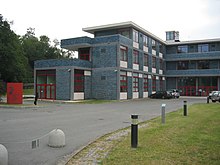
Summary
Interaction Design Institute Ivrea (also known as Interaction Ivrea or IDII) was a two-year graduate program in the field of Interaction Design operating in the town of Ivrea, in Northern Italy.
 | |
| Type | Private |
|---|---|
| Active | 2001–2006 |
| Founding Director | Gillian Crampton Smith |
| Students | 56 |
| Location | Ivrea , Piedmont , Italy 45°27′30″N 7°52′30″E / 45.45820292694756°N 7.875056813430575°E |
| Campus | Urban |
| Website | interactionivrea |

The institute was based in the former Olivetti Study and Research Centre, sometimes referred to as Casa Blu, designed by Eduardo Vittorio in 1955 and restored by Sottsass Associati.[1][2][3]
History edit
The Interaction Design Institute Ivrea Association was founded on 16 June 2000 by Telecom Italia and Olivetti, with its headquarters in Ivrea, with the first class of students arriving in 2001. The founding director of the school was Gillian Crampton Smith[4] until 2005. The school's mission was described in Blueprint[5] as:
- "Ivrea will explore business in addition to design and technology. Crampton Smith believes that today there is an 'art' in imagining new business models, and is also aware that, partly because of their broad education, design graduates often move into strategic roles in companies and need to be equipped to learn for themselves."
Among the academic advisors of Interaction Ivrea were leading practitioners and theorists like John Maeda, Ranjit Makkuni, Joy Mountford, John Thackara, Bill Verplank, Nathan Shedroff,[6] Bill Moggridge (co-founder of IDEO) and David Liddle (co-founder of Interval Research).
While the institute also did a measure of outside consulting work and hosted visiting researchers, its main activity was the Interaction Design Master course, a 2-year unaccredited course which graduated 56 students.[7]
Closure edit
The school operated between 2001[8] and 2006[9] after its initial 5-year endowment from Telecom Italia ended and was not renewed. Gillian Crampton-Smith resigned as Director a result of the announcement, and Neil Churcher and Heather Martin became co-directors during the final academic year when the institute was moved to Milan to be in the same building as Domus Academy, another Telecom Italia investment. The curriculum was subsequently merged with Domus's Interaction Design course and IDII's operation ceased in 2007. Its exhibition design unit (E1) was spun off to form an independent company, Interaction Design Lab,[10] currently operating in Milan. The original program website was archived.[11]
Notable works edit
The institute was the birthplace of products like the electronics prototyping boards Wiring and Arduino,[12] the graphics software prototyping environment Processing (started at the MIT Media Lab)[citation needed], the CICCIO inflatable environment,[13] and the connected product Good Night Lamp,[14] which is included in the permanent collection of the London Design Museum. Interaction Ivrea student work was exhibited at the Victoria and Albert's museum in London[15] and at Salone del Mobile in Milan. Publications include the Interaction Design Primer design manual.[16] It was also part of the Convivio[17] Network of Excellence European research project.
Legacy edit
Despite its brief lifespan and limited overall number of students and researchers, the institute had an outsize impact on the field of interaction design.[18]
Alumni and ex-faculty have worked in places like Uber, Microsoft, Apple, IDEO, and frog design, or continued to teach in institutions like NABA, Domus Academy, Università Iuav di Venezia,[19] VCU, the Delft University of Technology, the Centro Metropolitano de Diseño of the City of Buenos Aires,[20] and the University of Applied Sciences Potsdam.[21] Some started their own company like CuteCircuit.
Alumni and former staff members set up the Copenhagen Institute of Interaction Design in 2006, with elements of the pedagogic approach based on that from IDII.[22]
References edit
- ^ "Olivetti Study and Research Centre". Ivrea. Retrieved 2021-09-13.
- ^ "Casa Blu". Interaction Design Institute Ivrea. 2019-12-28. Retrieved 2021-09-13.
- ^ "The Incredible Story of the School in Ivrea Educating Today's Leaders in Silicon Valley". ELLE Decor (in Italian). 2021-07-15. Retrieved 2024-02-11.
- ^ interaction-venice.com
- ^ Macdonald, Nico (2005-04-18). "Action, Interaction, Reaction". Blueprint. p. 6. Archived from the original on 2003-08-10. Retrieved 2008-09-23.
- ^ "Nathan Shedroff". Retrieved 2009-10-04.
- ^ [1]
- ^ Scalise, Irene Maria (2001-10-03). "arrivano i designer interattivi" (in Italian). Repubblica. Retrieved 2008-09-23.
- ^ "Interaction Design Institute, fuga a Milano". La Sentinella del Canavese (in Italian). 2005-04-18. p. 2. Retrieved 2008-09-23.
- ^ "Interaction Design Lab". Retrieved 2009-10-04.
- ^ http://interactionivrea.org/en/index.asp
- ^ "The Untold History of Arduino". Retrieved 2023-12-17.
- ^ "CICCIO Project". Retrieved 2012-10-14.
- ^ "Good Night Lamp – designswarm". Retrieved 2021-12-13.
- ^ "Touch Me". Victoria and Albert's Museum. 2005-06-16. Retrieved 2008-09-23.
- ^ "Interaction Design Primer". Postmedia Books. 2005-01-01. Archived from the original on 2008-09-22. Retrieved 2008-10-28.
- ^ "Convivio". European Union. 2003-01-01. Archived from the original on 2006-07-24. Retrieved 2008-09-23.
- ^ Conti, Elisabetta Donati De (2021-07-15). "The Incredible Story of the School in Ivrea Educating Today's Leaders in Silicon Valley". ELLE Decor (in Italian). Retrieved 2022-01-13.
- ^ "Università IUAV di Venezia". IUAV. 2003-01-01. Retrieved 2008-10-28.
- ^ https://www.buenosaires.gob.ar/cmd
- ^ https://web.archive.org/web/20160227031853/http://www.fh-potsdam.de/studieren/design/studiengaenge/interfacedesign/
- ^ "The Interaction-Ivrea offspring". Core77. Retrieved 2021-09-13.


